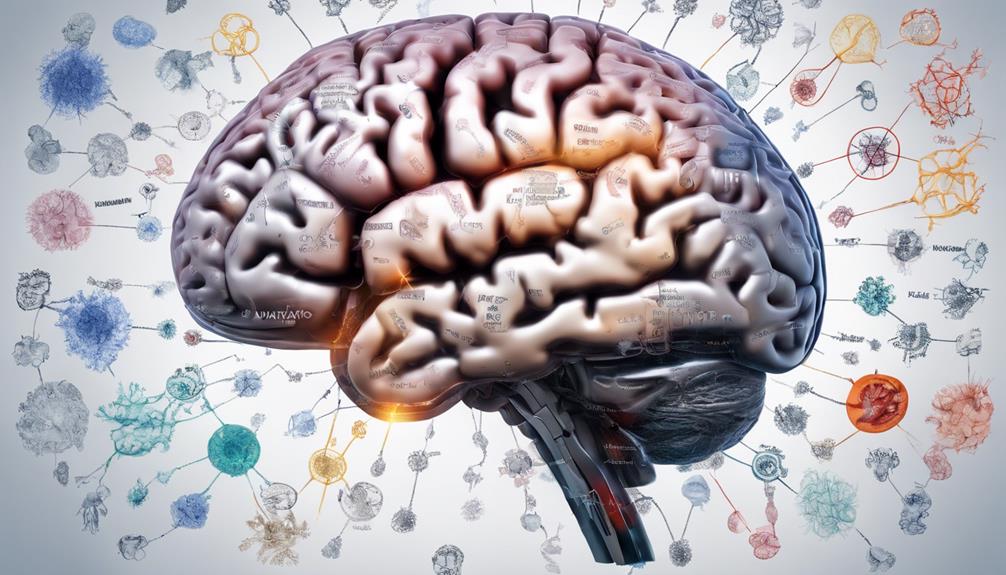Welcome to the mysterious world of ICD-10 codes, where each number holds significance in solving healthcare puzzles. Let’s journey together through this complex maze and delve into the details of the G31.83 code, focusing on Lewy body dementia.
Understanding this code is not just about documentation; it's a gateway to deciphering the complexities of diagnosing and treating a condition that often eludes easy classification.
Curious to unravel the layers of this cryptic coding system?
Overview of Lewy Body Dementia ICD-10 Code
When diagnosing Lewy body dementia, healthcare professionals utilize the specific ICD-10 code G31.83. This neurodegenerative disease is characterized by a combination of cognitive, motor, and psychiatric symptoms. Understanding the clinical features and coding guidelines is crucial for accurate diagnosis.
The ICD-10-CM code G31.83 helps streamline the process by providing a standardized way to classify and track cases of Lewy body dementia. Proper coding involves sequencing the underlying condition first, followed by any associated manifestations as per ICD-10 guidelines.
Importance of Accurate Diagnosis

Accurately diagnosing Lewy body dementia is essential for effective treatment planning and management. When it comes to neurocognitive disorders like Lewy body dementia, accurate diagnosis holds significant importance for several reasons:
- Avoiding Misdiagnosis: Misdiagnosis can lead to inappropriate interventions, potentially worsening the patient's condition.
- Recognizing Clinical Features: Understanding the unique clinical features of Lewy body dementia is crucial in distinguishing it from other neurocognitive disorders.
- Involvement of Healthcare Professionals: Proper evaluation by healthcare professionals, such as neurologists and geriatric specialists, is vital for achieving an accurate diagnosis.
Healthcare professionals play a key role in ensuring individuals with Lewy body dementia receive timely and accurate diagnoses. Early identification allows for the prompt initiation of interventions that can positively impact the quality of life for those affected by this condition.
Managing Lewy Body Dementia Effectively
Managing Lewy Body Dementia effectively requires a comprehensive approach that incorporates medication, non-pharmacological interventions, caregiver support, and regular monitoring by healthcare providers. Medications can help alleviate cognitive and motor symptoms in individuals with Lewy body dementia. Non-pharmacological interventions, such as physical therapy, play a significant role in enhancing the quality of life for those with this disorder. Caregiver support and education are vital components in effectively managing Lewy Body Dementia. Regular follow-up with healthcare providers is crucial for monitoring the progression of the disorder with Lewy bodies, as treatment focuses on symptom management due to the absence of a cure. Below is a table summarizing key aspects of managing Lewy Body Dementia effectively:
| Aspect | Description |
|---|---|
| Medication | Alleviates cognitive and motor symptoms |
| Non-pharmacological Interventions | e.g., Physical therapy to improve quality of life |
| Caregiver Support | Essential for effective management |
| Symptom Management | Focus of treatment as no cure currently exists |
| Regular Follow-up | Crucial for monitoring disease progression |
Understanding Neurocognitive Disorders

Understanding Neurocognitive Disorders involves recognizing a spectrum of conditions, including Lewy body dementia and mild cognitive impairment, which are classified using specific ICD-10-CM codes for accurate billing and reimbursement purposes.
Neurocognitive disorders encompass a range of cognitive impairments that affect daily functioning and quality of life. These disorders often have underlying physiological conditions such as Alzheimer's and Parkinson's disease, which can manifest as Lewy body dementia. Proper understanding of these disorders is essential for accurate diagnosis and effective treatment planning.
Differentiation between various types of neurocognitive disorders is crucial for proper diagnosis and treatment planning.
Underlying physiological conditions like Alzheimer's and Parkinson's are often linked to neurocognitive disorders like Lewy body dementia.
Understanding the coding guidelines and clinical features of neurocognitive disorders aids in accurate identification and management of these conditions.
Billing and Coding Considerations
For accurate billing and coding of Lewy body dementia, healthcare providers utilize the ICD-10-CM code G31.83 as per coding guidelines. When using this code, it's crucial to sequence the underlying physiological condition first, followed by any manifestations.
Additionally, the code G31.83 should be accompanied by extra codes for mild neurocognitive disorders stemming from known physiological conditions. Understanding the coding guidelines for Lewy body dementia is essential for ensuring accurate reimbursement.
Proper documentation and adherence to coding conventions are necessary to effectively use the ICD-10-CM code G31.83 in billing and coding processes. Healthcare professionals must be meticulous in their coding practices to accurately reflect the complexity of Lewy body dementia and associated conditions, facilitating appropriate reimbursement and ensuring comprehensive care for patients with this condition.
Frequently Asked Questions
What Is the ICD-10 Code for Lewy Body Dementia?
We should always ensure that we accurately assign the ICD-10 code for Lewy body dementia, which is G31.83. It's crucial to follow the coding convention of sequencing the underlying condition first, like Lewy body dementia, followed by any manifestations.
Additional codes may be needed for mild neurocognitive disorders due to known physiological conditions. Proper understanding of the guidelines is essential for correct coding of Lewy body dementia under the G31.83 code.
What Is the Lewy Body Dementia?
Lewy body dementia is a neurodegenerative condition that involves abnormal protein deposits in the brain. It manifests with cognitive decline, movement problems, and visual hallucinations.
The symptoms can fluctuate, impacting alertness and attention levels. Diagnosis is challenging due to overlapping symptoms with other conditions. Management focuses on symptom relief and support for both the individual and caregivers.
It's important to seek medical advice for proper evaluation and care.
What Is the ICD-9 Code for Lewy Body Dementia?
We should use the updated ICD-10 code G31.83 for Lewy body dementia, instead of the ICD-9 code 331.82, for accurate coding and billing. Transitioning to ICD-10 codes is crucial as ICD-9 codes are no longer used for medical reporting and reimbursement.
The ICD-10 code G31.83 offers more detailed information and specificity for diagnosing Lewy body dementia. Healthcare providers must ensure proper use of ICD-10 codes to document and manage cases effectively.
What Is the ICD-10 Code for Fo2 80?
Well, look at us diving into the ICD-10 coding world! The code F02.80, nestled under F02 for dementia in other diseases, is what you're after. Remember to slot it in after coding the root condition, like Alzheimer's or Parkinson's.
Exclude G31.83 for dementia with Parkinsonism. Understanding these guidelines ensures accurate use of F02.80.
Keep sequencing in mind for proper coding prowess!
Conclusion
In navigating the complexities of Lewy body dementia, understanding the ICD-10 code G31.83 is crucial for accurate diagnosis and effective management.
By prioritizing billing and coding considerations, healthcare professionals can streamline the process and provide optimal care for patients.
Let's embark on this journey together, unlocking the code to better health and well-being.
Let's paint a picture of hope and progress, one code at a time.









